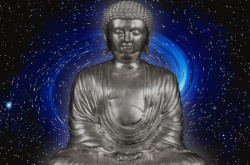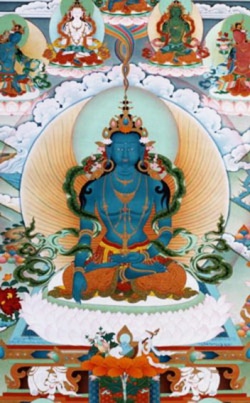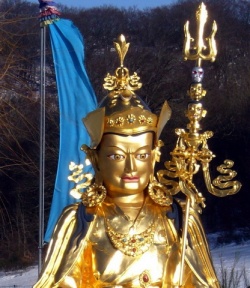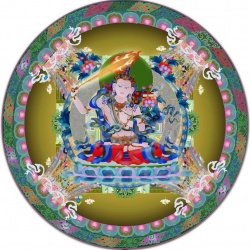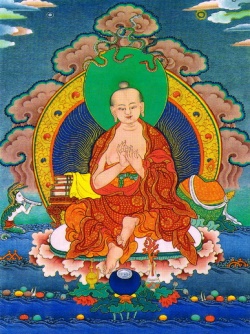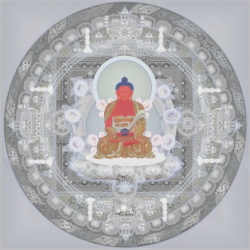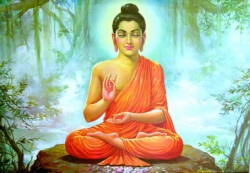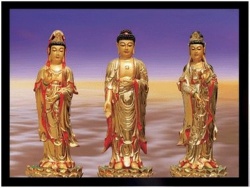Paṭhamakathāvatthusuttaṁ (Aṅg. 10.69): The First Discourse on the Bases for Talk
Paṭhamakathāvatthusuttaṁ (Aṅg. 10.69)
The First Discourse on the Bases for Talk
Edited & Translated by
Ānandajoti Bhikkhu
Ekaṁ samayaṁ Bhagavā Sāvatthiyaṁ viharati,
At one time the Gracious One was dwelling near Sāvatthī,
Jetavane Anāthapiṇḍikassa ārāme.
in Jeta's Wood, at Anāthapiṇḍika's monastery.
Tena kho pana samayena sambahulā bhikkhū,
Then at that time many monks,
pacchābhattaṁ piṇḍapātapaṭikkantā,
after returning from the alms-round after the meal,
upaṭṭhānasālāyaṁ sannisinnā sannipatitā,
assembling together, and sitting in the attendance hall,
anekavihitaṁ tiracchānakathaṁ anuyuttā viharanti, seyyathidaṁ:
dwelt engaged in countless kinds of animal-talk, [1] such as:
rājakathaṁ corakathaṁ mahāmattakathaṁ,
talk about kings, talk about thieves, talk about ministers,
senākathaṁ bhayakathaṁ yuddhakathaṁ,
talk about armies, talk about dangers, talk about wars,
annakathaṁ pānakathaṁ vatthakathaṁ sayanakathaṁ
talk about food, talk about drinks, talk about clothes, talk about beds,
mālākathaṁ gandhakathaṁ ñātikathaṁ yānakathaṁ,
talk about garlands, talk about incense, talk about relatives, talk about vehicles,
gāmakathaṁ nigamakathaṁ nagarakathaṁ janapadakathaṁ,
talk about villages, talk about towns, talk about cities, talk about states,
itthikathaṁ sūrakathaṁ visikhākathaṁ kumbhaṭṭhānakathaṁ,
talk about women, talk about heros, talk about streets, talk about wells,
pubbapetakathaṁ nānattakathaṁ lokakkhāyikaṁ samuddakkhāyikaṁ,
talk about the deceased, talk about diversity, talk about nature, talk about oceans,
itibhavābhavakathaṁ iti vā ti.
or talk about profit and loss. [2]
Atha kho Bhagavā sāyanhasamayaṁ paṭisallānā vuṭṭhito,
Then the Gracious One, having risen from seclusion in the evening time,
yenupaṭṭhānasālā tenupasaṅkami,
went to the assembly hall,
upasaṅkamitvā, paññatte āsane nisīdi.
and after going, he sat down on the prepared seat.
Nisajja kho Bhagavā bhikkhū āmantesi:
Having sat down the Gracious One addressed the monks, (saying):
“Kāyanuttha bhikkhave etarahi kathāya sannisinnā sannipatitā,
“What is the talk about, monks, amongst those who have assembled together and are sitting here at present,
kā ca pana vo antarākathā vippakatā?” ti.
and what is the conversation that you left unfinished?”
“Idha mayaṁ, bhante pacchābhattaṁ piṇḍapātapaṭikkantā,
“Here, reverend Sir, after returning from the alms-round after the meal,
upaṭṭhānasālāyaṁ sannisinnā sannipatitā,
assembling together, and sitting in the attendance hall,
anekavihitaṁ tiracchānakathaṁ anuyuttā viharāma, seyyathidaṁ:
we dwelt engaged in countless kinds of animal-talk, such as:
rājakathaṁ corakathaṁ mahāmattakathaṁ,
talk about kings, talk about thieves, talk about ministers,
senākathaṁ bhayakathaṁ yuddhakathaṁ,
talk about armies, talk about dangers, talk about wars,
annakathaṁ pānakathaṁ vatthakathaṁ sayanakathaṁ
talk about food, talk about drinks, talk about clothes, talk about beds,
mālākathaṁ gandhakathaṁ ñātikathaṁ yānakathaṁ,
talk about garlands, talk about incense, talk about relatives, talk about vehicles,
gāmakathaṁ nigamakathaṁ nagarakathaṁ janapadakathaṁ,
talk about villages, talk about towns, talk about cities, talk about states,
itthikathaṁ sūrakathaṁ visikhākathaṁ kumbhaṭṭhānakathaṁ,
talk about women, talk about heros, talk about streets, talk about wells,
pubbapetakathaṁ nānattakathaṁ lokakkhāyikaṁ samuddakkhāyikaṁ,
talk about the deceased, talk about diversity, talk about nature, talk about oceans,
itibhavābhavakathaṁ iti vā” ti.
or talk about profit and loss.”
“Nakhvetaṁ bhikkhave tumhākaṁ patirūpaṁ
“This is certainly not suitable, monks, for you
kulaputtānaṁ saddhā agārasmā anagāriyaṁ pabbajitānaṁ,
sons of good family who through faith have gone forth from the home to homelessness,
yaṁ tumhe anekavihitaṁ tiracchānakathaṁ anuyuttā vihareyyātha, seyyathidaṁ:
that you should dwell engaged in countless kinds of animal-talk, such as:
rājakathaṁ corakathaṁ mahāmattakathaṁ,
talk about kings, talk about thieves, talk about ministers,
senākathaṁ bhayakathaṁ yuddhakathaṁ,
talk about armies, talk about dangers, talk about wars,
annakathaṁ pānakathaṁ vatthakathaṁ sayanakathaṁ
talk about food, talk about drinks, talk about clothes, talk about beds,
mālākathaṁ gandhakathaṁ ñātikathaṁ yānakathaṁ,
talk about garlands, talk about incense, talk about relatives, talk about vehicles,
gāmakathaṁ nigamakathaṁ nagarakathaṁ janapadakathaṁ,
talk about villages, talk about towns, talk about cities, talk about states,
itthikathaṁ sūrakathaṁ visikhākathaṁ kumbhaṭṭhānakathaṁ,
talk about women, talk about heros, talk about streets, talk about wells,
pubbapetakathaṁ nānattakathaṁ lokakkhāyikaṁ samuddakkhāyikaṁ,
talk about the deceased, talk about diversity, talk about nature, talk about oceans,
itibhavābhavakathaṁ iti vā ti.
or talk about profit and loss.
Dasayimāni, bhikkhave, kathāvatthūni.
There are these ten bases for talk, monks.
Katamāni dasa?
Which ten?
Appicchakathā, santuṭṭhikathā, pavivekakathā, asaṁsaggakathā,
Talk about wanting little, talk about contentment, talk about seclusion, talk about disassociation,
vīriyārambhakathā, sīlakathā, samādhikathā, paññākathā,
talk about energy, talk about morality, talk about concentration, talk about wisdom,
vimuttikathā, vimuttiñāṇadassanakathāti.
talk about liberation, talk about insight and knowledge of liberation.
Imāni kho, bhikkhave, dasa kathāvatthūni.
These, monks, are the ten bases for talk.
Imesaṁ ce tumhe, bhikkhave, dasannaṁ kathāvatthūnaṁ
If you, monks, were to speak
upādāyupādāya kathaṁ katheyyātha,
concerning these ten bases for talk,
imesam-pi Candimasūriyānaṁ, evaṁmahiddhikānaṁ evaṁmahānubhāvānaṁ,
even the glory of the Moon and the Sun, of such great power, of such great majesty,
tejasā tejaṁ pariyādiyeyyātha,
would be overcome by (your) glory,
ko pana vādo aññatitthiyānaṁ paribbājakānan!”-ti
what to say about the wanderers of other sects!”
Footnotes
- ↑ Comm: aniyyānikattā saggamokkhamaggānaṁ tiracchānabhūtaṁ kathaṁ; animal(–like) talk which does not lead onwards along the Path to Heaven or Freedom.
- ↑ The list summarises exactly the sort of material the media is full of: the main news (kings, thieves, ministers, armies, dangers, wars), home news (food, drinks, clothes, beds, relatives, vehicles), local news (villages, towns, cities, states), entertainment news (garlands, incense, women, heros), science news (the deceased, diversity, nature, oceans), and the business news (profit and loss).
